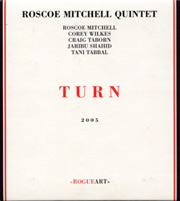Roscoe
Mitchell Quintet
Turn
(RogueArt)
During
the last five years, Roscoe Mitchell's discography had seen the start
of a new chapter: The Note Factory, a "variable identity"
nonet that Mitchell himself had defined as "an ensemble of improvising
musicians with an orchestral range"; two pianos, two double basses,
two drum/percussion sets, trumpet, trombone or guitar, plus the leader's
many wind and percussion instruments. Caught live, the group had been
fantastic, while their two studio albums - Nine To Get Ready (1999)
and Song For My Sister (2002) - were both excellent.
Compared
to the nonet, the new quintet appearing on Turn can only produce a tiny
sound mass - and, I suspect, ambitions were also somewhat smaller this
time - while the stylistic coordinates are the usual Mitchell stuff.
Musicians who appear on the album are familiar faces to those who know
Mitchell's discography: Tani Tabbal on drums and percussion, Jaribu
Shahid on double bass, electric bass and percussion, Craig Taborn on
piano and Corey Wilkes on trumpet - I was not familiar with Wilkes at
the time of Song For My Sister, and he had impressed me quite favourably.
The smaller instrumentation has maybe suggested a more "classic"
approach, but results are not less noteworthy for this. Areas are by
now those to be expected on a Mitchell record - the "free-sounding"
piece with the dry alto, the piece for percussion where time stands
still, the "almost-baroque" piece with flute and piccolo -
but this is not a problem, provided one doesn't like to experience only
new situations. Fourteen tracks, mostly sounding fresh, in a bit more
than one hour.
Quintet
One is a nice opener, with its nice "swinging" theme for sax
and trumpet which gives space to the ensemble (double bass played with
arco) and a nice alto solo by Mitchell; play it side by side with Quintet
Nine, featuring piccolo, a trumpet solo with a "classic" group
backing, then double bass (arco again) and flute, then we are back to
the "swing" theme. For Cynthia is typical of Mitchell, with
its concentrated atmosphere, a dry trumpet and the rhythm section playing
"against" the melody. Percussions come to the fore on For
Now and Page Two A, while the bass sax makes its welcomed return on
March 2004. In Six has a sad-sounding theme that would sound appropriate
when played on an accordion. Page One has a fine theme and an appropriate
development, That's Finished has nice percussion, while the very slow
alto on After brings the album to its close.
Beppe Colli
© Beppe Colli 2005
CloudsandClocks.net | Nov. 2, 2005











